- Home
- Virginia Woolf
Between the Acts Page 6
Between the Acts Read online
Page 6
When the aim of art is transformative vision, it becomes difficult to gauge its success. When audience members leave asking questions, some part of the pageant’s dynamics is carried out into the world. Furthermore, in a scene that “rhymes” with the theatrical mirrors, Lucy Swithin gazes at “reflections” of “ourselves” in the pond (139). In the fish, she sees multiplicity, variety, and beauty; in the lily pads, a broader vision of other continents on the globe. In a small way, she, too, along with bits of other voices, continues part of the pageant’s work. Overall, nonetheless, the effect of the day’s performance is, like the play itself, a jumbled dispersion of orts and scraps. Transmission and communication are fallible; the materials are too complex, both creation and reception are flawed. Yet disappointments are followed by a series of rebeginnings, enacted on different levels again through rhyming scenes: Miss La Trobe turns to the prospect of another play; Isa and Giles, out of their conflict, may conceive another child; Lucy returns to read once more the story of the beginning of human life. What the pattern means, however, continues to hover in between: An endless, biologically driven cycle compelled by the sex war (imaged in the picture of the cock and the hen in the pub) and the maternal compulsion to give birth (the cow in the stable)? Or the ancient, regenerative ritual of the seasons, celebrating the fertility and fecundity of the land?
In the mind of the artist, at least, the new cycle is initiated through a creative, regenerative act. Out of the land (the mixed violence and vibrancy of the bird-buzzing tree [142]), solitude (ironically aided by La Trobe’s own marginalization as an artist and lesbian, and being suspiciously foreign), and human voices (the common talk, excluding but surrounding her, in the pub), a new play begins to form. The outer, conscious world must also, however, leak into the unconscious, a process figured as a descent into the depths of the pool (144). For as Bart Oliver intuits, what La Trobe needs, at the end of the day, is “darkness in the mud; a whisky and soda at the pub; and coarse words descending like maggots through the waters” (138). Just as her pageant was made out of words that have been said before, so the voices of the villagers sink into La Trobe’s subconscious—the primeval scene of both struggle and fertility—resting, at the pool’s bottom, in the organic mud. The mind, the image implies, is a reservoir, where all that is collectively good and bad, admirable and shameful, all purities and impurities, must be absorbed. As perhaps the most comprehensive of Woolf’s novels, Between the Acts reaches toward the totality of the human condition, its violence as well as its peace. But then, echoing the conversation’s opening controversial image of the cesspool, the mind’s “fertile mud” becomes the transformative place out of which new combinations, new creations, might arise (144).
If the novel thus ends with suggestions of art’s regenerative possibilities, its readers will inevitably grapple with the questions raised by Woolf’s death. After writing such resiliency for her fictional artist, Woolf, shortly after she finished the typescript, made the choice to end her own life. Her reason was the onset of another terrible period of mental and physical illness; and given the expectations still that Hitler might invade at any moment, and the implications of her being possibly incapacitated when he did, we should be wary of making any simple connections between her decision and this work. What should matter most to us now is her enduring, poignant legacy of a work in progress, both literally and in intent. For in both the pageant and the novel, the task of rebuilding civilization’s wall (123) is left for those who will survive.
In the final words of the novel, the curtain rises, opening ominously on the act to come. Everything we have been reading—the novel, and by implication, art itself—is placed “between the acts.” As participants in the novel, we, too, shift our location once again. In our own palimpsestic layering, we have been the audience for the novel; we have become, like the audience in the pageant, the players self-reflected in its glass; and we are now finally positioned as writers, called on to supply the next words. For after its multiple pathways and trajectories, the novel ends on the need for act and action, leaving us on the point of suspension between the moments “now” and “next” In a later essay, “Thoughts on Peace in an Air Raid” (1940), Woolf looked ahead to the future, to the question of whether peace, rather than conflict, could be the informing condition of our lives. She urged the need to fight with the mind and ideas rather than with arms, but she also made clear the joint task: “Unless we can think peace into existence we—not this one body in this one bed but millions of bodies yet to be born—will lie in the same darkness and hear the same death rattle overhead” (243). To think peace, we must rely on collaborative effort performed by each and every one.
The value of literature, Between the Acts asserts, is to stimulate those processes of thinking, but in doing so, literature confronts us with questions that are complex, difficult, and unresolved. Do heterogeneity and hybridity, in this novel, offer a revolutionary alternative to oppositional political and national binaries? Could the competitive and aggressive thinking of warfare be superseded by the ability to think through multiple, contradictory views? Could such in-between consciousness generate an ethics of pluralism and a tolerance of diversity, mixed with an equally important connectivity and multivalent interdependency, too? Such are the large questions that readers and critics of this novel debate, with many more besides. But then, letting us speculate thus broadly, literature, most usefully, returns us to the particular scene. We are concerned, after all, with a twenty-four-hour day in a small community, in England, in 1939. We must focus our attention on a small, localized world of ordinary people, involved in a seemingly simple plot.
NOTES
1 “A Scrap-book of Rodmell and Southease in the county of Sussex, produced by the Rodmell and Southease Women’s Institute, 1950.” Compiled by Mrs. Gladys Freeth. According to Mrs. Freeth’s records, Twelfth Night was also performed in Rodmell in 1951 and 1938. I would like to thank the Rodmell and Southease Women’s Institute for permission to cite this scrapbook, and member Madeleine Harvey for her help.
2 A Web site for St. Peter’s Church in Rodmell states that “Henry the Eighth gave Anne Boleyn the manor house of Rodmell and Princess Elizabeth walked here in the gap between the downs that even now is known as Princess Gap.” http://yeoldesussexpages.com/churches/suschur/rodmell/rodmell.htm
3 Critic, “A London Diary,” New Statesman and Nation, August 31, 1940: 203.
4 The title of an essay Virginia Woolf published in 1924, and also given to a group of essays published in her Common Reader (1925).
5 One clearly evident meaning of the title, as critics have suggested, is “between the [world] wars.” In a similar time out from cultural war, the extraordinary meeting in the mosque between Aziz and Mrs. Moore in chapter 2 of E. M. Foster’s A Passage to India takes place, as Mrs. Moore explains in the next chapter, when she left the British club “between the acts” of the performance of the play Cousin Kate (E. M. Forster, A Passage to India, San Diego: Harcourt, 1965).
6 “I suppose what I expect is that they’ll say now that Mrs W. has written a long book about nothing” (Diary 5: 58). Woolf writes this criticism, or perhaps limited perception, into an anonymous audience member’s response to Miss La Trobe’s pageant: “All that fuss about nothing!” (95)
7 For the connections between Woolf’s voices and sound technologies, see my chapter, “Virginia Woolf, Sound Technologies, and the New Aurality,” Virginia Woolf in the Age of Mechanical Reproduction: Music, Cinema, Photography, and Papular Culture. Edited by Pamela Caughie, 69–96. New York: Garland, 2000.
8 “In the Attic tragedy, the chorus were ‘interested spectators,’ sympathizing with the fortunes of the characters, and giving expression, between the ‘acts,’ to the moral and religious sentiments evoked by the action of the play” (Oxford English Dictionary).
WORKS CITED
Bakhtin, M. M. “Discourse in the Novel.” In The Dialogic Imagination. Translated by Caryl Emerson and Michael Holquist, 259–422. Austin: University of Texas Press, 1981.
Barthes, Roland. Image—Music—Text. Translated by Stephen Heath. New York: Noonday, 1977.
Beer, Gillian. Between the Acts by Virginia Woolf. With an introduction and notes by Gillian Beer. London: Penguin, 1992.
Garnett, David. “Virginia Woolf.” New Statesman and Nation, 12 April 1941: 386.
Leaska, Mitchell A. Pointy Hall: The Earlier and Later Typescripts of Between the Acts. New York: University Publications, 1983.
Richards, I. A. Practical Criticism: A Study of Literary Judgment. 1929. Reprint, New York: Harcourt, 1956.
Woolf, Leonard S. “The Pageant of History.” In Essays on Literature, History, Politics, Etc. Freeport, NY: Books for Libraries, 1927.
Woolf, Virginia. “Craftsmanship.” In The Death of the Moth and Other Essays, 198–207. 1942. Reprint, New York: Harcourt Brace Jovanovich, 1974.
——“Poetry, Fiction and the Future.” In The Essays of Virginia Woolf. Vol. 4: 1925–1928. Edited by Andrew McNeillie, 428–41. London: Hogarth Press, 1994.
——“Twelfth Night at the Old Vic.” In The Death of the Moth and Other Essays, 45–50. 1942. Reprint, New York: Harcourt Brace Jovanovich, 1974.
NOTE
The MS. of this book had been completed, but had not been finally revised for the printer, at the time of Virginia Woolf’s death. She would not, I believe, have made any large or material alterations in it, though she would probably have made a good many small corrections or revisions before passing the final proofs.
LEONARD WOOLF
IT WAS a summer’s night and they were talking, in the big room with the windows open to the garden, about the cesspool. The county council had promised to bring water to the village, but they hadn’t.
Mrs. Haines, the wife of the gentleman farmer, a goosefaced woman with eyes protruding as if they saw something to gobble in the gutter, said affectedly: “What a subject to talk about on a night like this!”
Then there was silence; and a cow coughed; and that led her to say how odd it was, as a child, she had never feared cows, only horses. But, then, as a small child in a perambulator, a great cart-horse had brushed within an inch of her face. Her family, she told the old man in the arm-chair, had lived near Liskeard for many centuries. There were the graves in the churchyard to prove it.
A bird chuckled outside. “A nightingale?” asked Mrs. Haines. No, nightingales didn’t come so far north. It was a daylight bird, chuckling over the substance and succulence of the day, over worms, snails, grit, even in sleep.
The old man in the arm-chair—Mr. Oliver, of the Indian Civil Service, retired—said that the site they had chosen for the cesspool was, if he had heard aright, on the Roman road. From an aeroplane, he said, you could still see, plainly marked, the scars made by the Britons; by the Romans; by the Elizabethan manor house; and by the plough, when they ploughed the hill to grow wheat in the Napoleonic wars.
“But you don’t remember . . .” Mrs. Haines began. No, not that. Still he did remember——and he was about to tell them what, when there was a sound outside, and Isa, his son’s wife, came in with her hair in pigtails; she was wearing a dressing-gown with faded peacocks on it. She came in like a swan swimming its way; then was checked and stopped; was surprised to find people there; and lights burning. She had been sitting with her little boy who wasn’t well, she apologized. What had they been saying?
“Discussing the cesspool,” said Mr. Oliver.
“What a subject to talk about on a night like this!” Mrs. Haines exclaimed again.
What had he said about the cesspool; or indeed about anything? Isa wondered, inclining her head towards the gentleman farmer, Rupert Haines. She had met him at a Bazaar; and at a tennis party. He had handed her a cup and a racquet—that was all. But in his ravaged face she always felt mystery; and in his silence, passion. At the tennis party she had felt this, and at the Bazaar. Now a third time, if anything more strongly, she felt it again.
“I remember,” the old man interrupted, “my mother. . . .” Of his mother he remembered that she was very stout; kept her tea-caddy locked; yet had given him in that very room a copy of Byron. It was over sixty years ago, he told them, that his mother had given him the works of Byron in that very room. He paused.
“She walks in beauty like the night,” he quoted.
Then again:
“So we’ll go no more a-roving by the light of the moon.”
Isa raised her head. The words made two rings, perfect rings, that floated them, herself and Haines, like two swans down stream. But his snow-white breast was circled with a tangle of dirty duckweed; and she too, in her webbed feet was entangled, by her husband, the stockbroker. Sitting on her three-cornered chair she swayed, with her dark pigtails hanging, and her body like a bolster in its faded dressing-gown.
Mrs. Haines was aware of the emotion circling them, excluding her. She waited, as one waits for the strain of an organ to die out before leaving church. In the car going home to the red villa in the cornfields, she would destroy it, as a thrush pecks the wings off a butterfly. Allowing ten seconds to intervene, she rose; paused; and then, as if she had heard the last strain die out, offered Mrs. Giles Oliver her hand.
But Isa, though she should have risen at the same moment that Mrs. Haines rose, sat on. Mrs. Haines glared at her out of goose-like eyes, gobbling, “Please, Mrs. Giles Oliver, do me the kindness to recognize my existence. . . .” which she was forced to do, rising at last from her chair, in her faded dressing-gown, with the pigtails falling over each shoulder.
Pointz Hall was seen in the light of an early summer morning to be a middle-sized house. It did not rank among the houses that are mentioned in guide books. It was too homely. But this whitish house with the grey roof, and the wing thrown out at tight angles, lying unfortunately low on the meadow with a fringe of trees on the bank above it so that smoke curled up to the nests of the rooks, was a desirable house to live in. Driving past, people said to each other: “I wonder if that’ll ever come into the market?” and to the chauffeur: “Who lives there?”
The chauffeur didn’t know. The Olivers, who had bought the place something over a century ago, had no connection with the Warings, the Elveys, the Mannerings or the Burnets; the old families who had all intermarried, and lay in their deaths intertwisted, like the ivy roots, beneath the churchyard wall.
Only something over a hundred and twenty years the Olivers had been there. Still, on going up the principal staircase—there was another, a mere ladder at the back for the servants—there was a portrait. A length of yellow brocade was visible half-way up; and, as one reached the top, a small powdered face, a great head-dress slung with pearls, came into view; an ancestress of sorts. Six or seven bedrooms opened out of the corridor. The butler had been a soldier; had married a lady’s maid; and, under a glass case there was a watch that had stopped a bullet on the field of Waterloo.
It was early morning. The dew was on the grass. The church clock struck eight times, Mrs. Swithin drew the curtain in her bedroom—the faded white chintz that so agreeably from the outside tinged the window with its green lining. There with her old hands on the hasp, jerking it open, she stood: old Oliver’s married sister; a widow. She always meant to set up a house of her own; perhaps in Kensington, perhaps at Kew, so that she could have the benefit of the gardens. But she stayed on all through the summer; and when winter wept its damp upon the panes, and choked the gutters with dead leaves, she said: “Why, Bart, did they build the house in the hollow, facing north?” Her brother said, “Obviously to escape from nature. Weren’t four horses needed to drag the family coach through the mud?” Then he told her the famous story of the great eighteenth-century winter; when for a whole month the house had been blocked by snow. And the trees had fallen. So every year, when winter came, Mrs. Swithin retired to Hastings.
But it was summer now: She had been waked by the birds. How they sang! attacking the dawn like so many choir boys attacking an iced cake. Forced to listen, she had stretched for her favourite reading—an Outline of History—and had spent the hours between three and five thinking of rhododendron forests in Piccadilly; when the entire continent, not then, she understood, divided by a channel, was all one; populated, she understood, by elephant-bodied, seal-necked, heaving, surging, slowly writhing, and, she supposed, barking monsters; the iguanodon, the mammoth, and the mastodon; from whom presumably, she thought, jerking the window open, we descend.
It took her five seconds in actual time, in mind time ever so much longer, to separate Grace herself, with blue china on a tray, from the leather-covered grunting monster who was about, as the door opened, to demolish a whole tree in the green steaming undergrowth of the primeval forest. Naturally, she jumped, as Grace put the tray down and said: “Good morning, Ma’am.” “Batty,” Grace called her, as she felt on her face the divided glance that was half meant for a beast in a swamp, half for a maid in a print frock and white apron.
“How those birds sing!” said Mrs. Swithin, at a venture. The window was open now; the birds certainly were singing. An obliging thrush hopped across the lawn; a coil of pinkish rubber twisted in its beak. Tempted by the sight to continue her imaginative reconstruction of the past, Mrs. Swithin paused; she was given to increasing the bounds of the moment by flights into past or future; or sidelong down corridors and alleys; but she remembered her mother—her mother in that very room rebuking her. “Don’t stand gaping, Lucy, or the wind’ll change . . .” How often her mother had rebuked her in that very room—“but in a very different world,” as her brother would remind her. So she sat down to morning tea, like any other old lady with a high nose, thin cheeks, a ring on her finger and the usual trappings of rather shabby but gallant old age, which included in her case a cross gleaming gold on her breast.

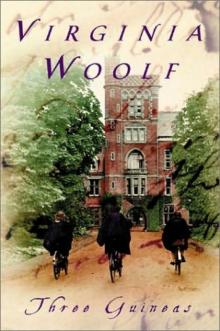 Three Guineas
Three Guineas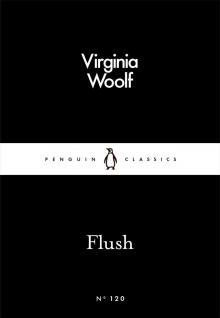 Flush
Flush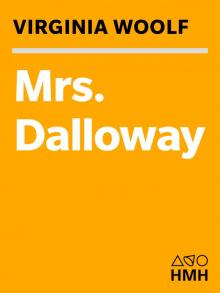 Mrs. Dalloway
Mrs. Dalloway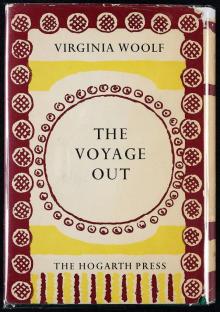 The Voyage Out
The Voyage Out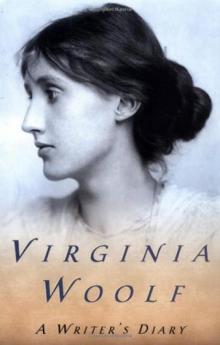 A Writer's Diary: Being Extracts From the Diary of Virginia Woolf
A Writer's Diary: Being Extracts From the Diary of Virginia Woolf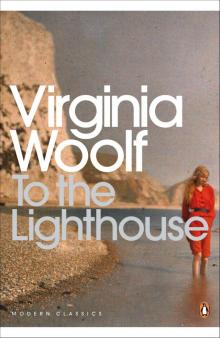 To The Lighthouse
To The Lighthouse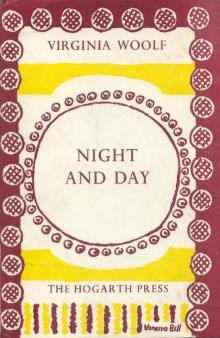 Night and Day
Night and Day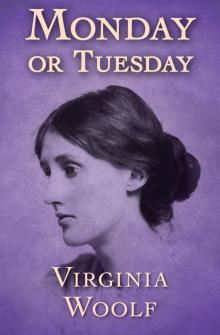 Monday or Tuesday
Monday or Tuesday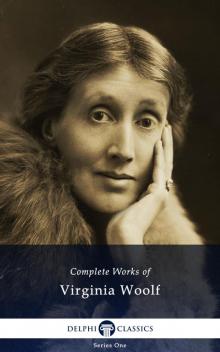 Complete Works of Virginia Woolf
Complete Works of Virginia Woolf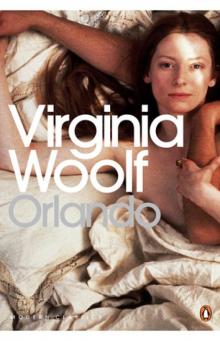 Orlando
Orlando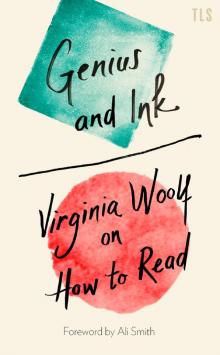 Genius and Ink
Genius and Ink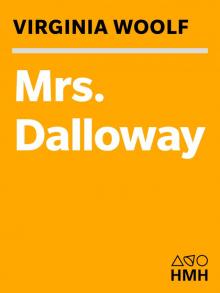 Mrs. Dalloway (Annotated)
Mrs. Dalloway (Annotated)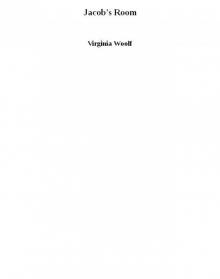 Jacob's Room
Jacob's Room THE RUSSIAN POINT OF VIEW
THE RUSSIAN POINT OF VIEW A Writer's Diary
A Writer's Diary Woolf Short Stories
Woolf Short Stories